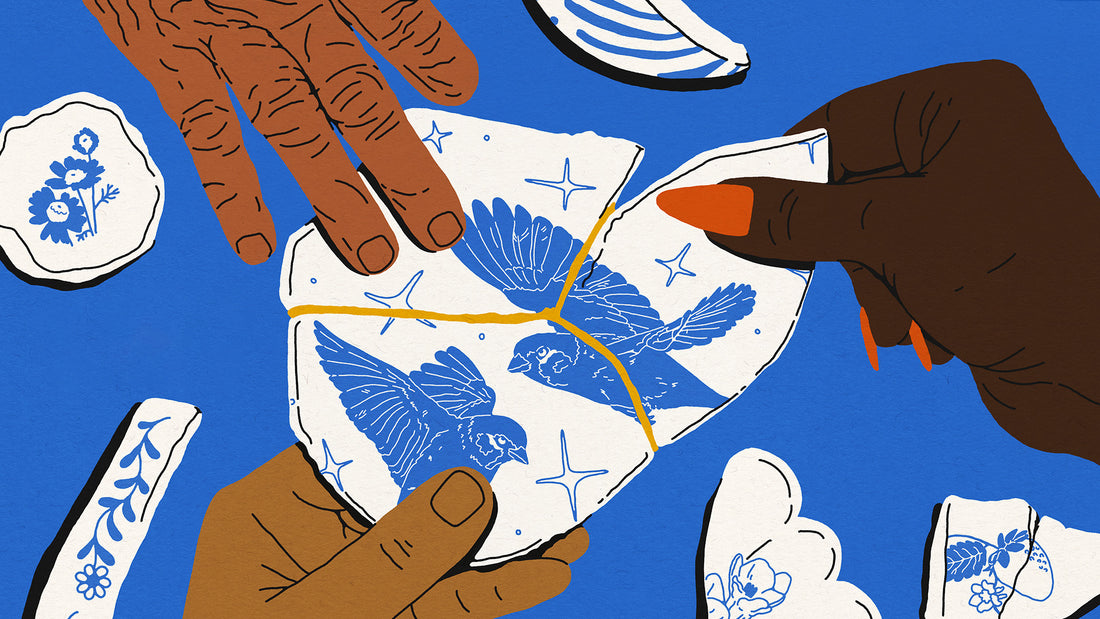
We mend what's broken when we come together
"Sometimes we have to do the work, even though we don’t yet see a glimmer on the horizon that it’s actually going to be possible. The groundwork has to be done on a daily basis. "
—Angela Davis, Freedom is A Constant Struggle
I’ve been overwhelmed by the barrage of Supreme Court rulings and the constant backdrop of political theater. These moments eclipse the reality that many vulnerable people continue to be disenfranchised, dispossessed, and killed by state-sanctioned violence, both locally and globally.
The overwhelm can quickly become the tug of despair, soon followed by an analgesic fall into cynicism. In these moments, I catch myself thinking, Why bother? We're hurtling towards fascism anyway; what can I realistically do to make any material difference?
"From prisons to the people who make our clothing and electronics, we are conditioned to accept dystopian conditions as an acceptable part of the landscape. Billionaires are countering our calls for transformative change by telling people that cynicism is realistic. They are encouraging people to give up on each other and the world and to consider the horrors of late capitalism inevitable."
— Kelly Hayes, Movement Memos podcast, ep. What Today’s Workers Can Learn From Machine Breaking Luddites
I wonder if part of our humanness is the desire for seismic and measurable shifts to quantify as progress —a clear indication that we are moving the needle against evil. We look for significant legislative changes or landmark court rulings as tangible proof of societal progress. These big, visible victories can make us feel like we're making a difference.
However, the commodification of every part of our lives has relieved us from exploring complex feelings of longing through the immediacy of consumerism and escapism found in nonprofits. We buy products marketed as "ethical" or "sustainable" to feel a quick sense of doing good without addressing deeper systemic issues. Similarly, participating in nonprofits can become a way to feel productive and virtuous, offering a temporary escape from the overwhelming reality of ongoing injustice.
"This kind of organizing takes a lot of patience because changing people and people changing themselves requires time. Because it usually involves only small groups of people, it lacks the drama and visibility of angry masses making demands on the power structure. So it doesn't seem practical to those who think of change only in terms of quick fixes, huge masses, and charismatic leaders."
— Grace Lee Boggs, The Next American Revolution
It's so much easier to fall into cynicism when we feel isolated from one another. But what if this recognition of feeling —what I'm feeling, and you're feeling, and we're collectively feeling, is a longing for connection? What if we are remembering that there is another way, and that way is through community?
"We tend to long for what our bodies need in order to heal and feel whole."
— Prentis Hemphill, What It Takes To Heal

But what if liberation requires something more subtle, nuanced, and messy? What if community, as a daily practice, is less glamorous but steadfast and consistent?
What if an antidote to cynicism is reaching for, sharing in, and building alongside the people in your life right now? That we can refuse cynicism through our interconnection. It's less flashy to walk with an unhoused neighbor to find them food and cold water, or to offer a friend help with access to a doctor's appointment or to commit to making small daily donations, but that is community care.
"The best we have [is] each other and our intention and our care and our commitment to liberation in our lifetime by any means necessary. And that there's not going to be one solution. That's not going to be a top-down thing. It's not going to be courts. It's not going to be litigation. It's not going to be policy. It's not going to be some one mass mobilization that's, you know, top-down. It's going to be each of us taking action, aligned around an intention, and experimenting. What are we doing that is shifting the conversation? How can we do more of that?" —Andrea J Ritchie, One Million Experiments podcast, ep. 19: Practicing New Worlds with Andrea J. Ritchie
Scanning the forest
Take a moment to check in with your body and mind. Find a comfortable position and take a few deep breaths. Notice any areas of tension or ease in your body, and acknowledge your current emotional state.
When you’re ready, proceed to the questions. Approach each one with kindness and curiosity, allowing yourself the space to explore your thoughts and feelings fully.
- What specific events or news have made you feel most overwhelmed recently?
- How can you connect those events with intersections of your identity?
- How do these events relate to global struggles for liberation?
- How do you experience the feeling of being overwhelmed? What physical or emotional signs do you notice?
- When you feel cynical about the future, what are the underlying fears or beliefs driving that cynicism?
Seeding new possibilities
- Have there been times when connecting with others has helped alleviate your feelings of isolation or despair? What did those connections look like?
- What are some practical ways you can contribute to building and sustaining community in your daily life?
- How can you encourage others to join you in these efforts, and what impact do you hope to achieve together?
Dive deeper into study:
- Movement Memos podcast, ep. What Today’s Workers Can Learn From Machine Breaking Luddites
- What It Takes To Heal by Prentis Hemphill
- Practicing New Worlds by Andrea J. Ritchie
- One Million Experiments podcast, ep. 19: Practicing New Worlds with Andrea J. Ritchie
- Freedom is A Constant Struggle by Angela Davis